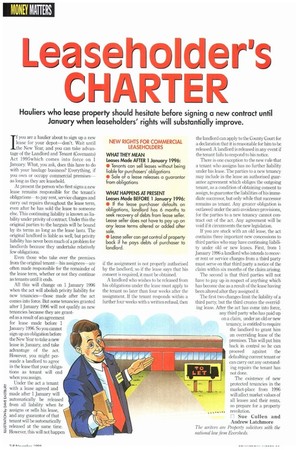C RTE R
Page 27

If you've noticed an error in this article please click here to report it so we can fix it.
If you are a haulier about to sign up a new lease for your depot—don't. Wait until the New Year, and you can take advantage of the Landlord and Tenant (Covenants) Act 1995which comes into force on 1 January What, you ask, does this have to do with your haulage business? Everything, if you own or occupy commercial premisesas long as they are leasehold.
At present the person who first signs a new lease remains responsible for the tenant's obligations--to pay rent, service charges and carry out repairs throughout the lease term, even after he has sold the lease to someone else. This continuing liability is known as liability under privity of contract. Under this the original parties to the bargain will be bound by its terms as long as the lease lasts. The original landlord is liable as well, but privity liability has never been much of a problem for landlords because they undertake relatively few obligations.
Even those who take over the premises from the original tenant—his assignees—are often made responsible for the remainder of the lease term, whether or not they continue as tenants until it ends.
All this will change on 1 January 1996 when the act will abolish privity liability for new tenancies—those made after the act comes into force. But some tenancies granted after 1 January 1996 will not qualify as new tenancies because they are grant
ed as a result of an agreement for lease made before 1 January 1996. So you cannot sign up an obligation before the New Year to take a new lease in January, and take advantage of the act. However, you might persuade a landlord to agree in the lease that your obligations as tenant will end when you assign.
Under the act a tenant 2 with a lease agreed and made after 1 January will automatically be released -1 from all liability when he ca
_tassigns or sells his lease, 6 and any guarantor of that 2 tenant will be automatically
released at the same time.
However, this will not happen if the assignment is not properly authorised by the landlord, so if the lease says that his consent is required, it must be obtained.
A landlord who wishes lobe released from his obligations under the lease must apply to the tenant no later than four weeks after the assignment. If the tenant responds within a further four weeks with a written refusal, then the landlord can apply to the County Court for a declaration that it is reasonable for him to be released. A landlord is released in any event if the tenant fails to respond to his notice.
There is one exception to the new rule that a tenant who assigns has no further liability under his lease. The parties to a new tenancy may include in the lease an authorised guarantee agreement which obliges the outgoing tenant, as a condition of obtaining consent to assign, to guarantee the liabilities of his immediate successor, but only while that successor remains as tenant. Any greater obligation is outlawed under the anti-avoidance provisions, for the parties to a new tenancy cannot contract out of the act. Any agreement will be void if it circumvents the new legislation.
If you are stuck with an old lease, the act contains three important new concessions to third parties who may have continuing liability under old or new leases. First, from 1 January 1996 a landlord who intends to recover rent or service charges from a third party must serve on that third party a notice of the claim within six months of the claim arising.
The second is that third parties will not have to pay up in respect of anything which has become due as a result of the lease having been altered after they assigned it.
The first two changes limit the liability of a third party, but the third creates the overriding lease. After the act has come into force, any third party who has paid up on a claim, under an old or new tenancy, is entitled to require the landlord to grant him an overriding lease of the premises. This will put him back in control so he can proceed against the defaulting current tenant or can carry out any outstanding repairs the tenant has not done.
The existence of new protected tenancies in the market-place from 1996 will affect market values of all leases and their rents, so prepare for a property revolution.
fl Sue Cullen and












































































































